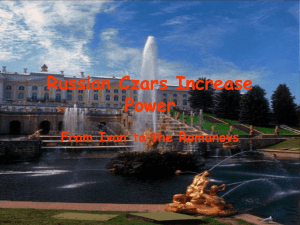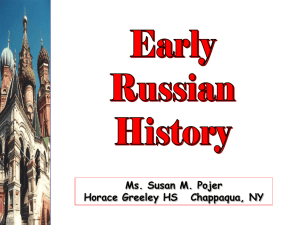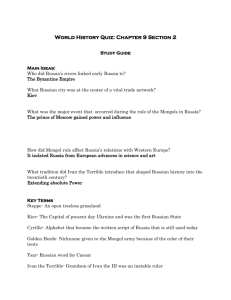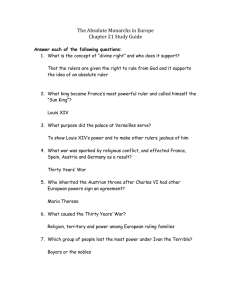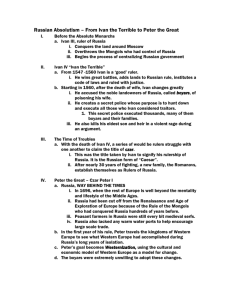Absolute Rulers of Russia •
advertisement
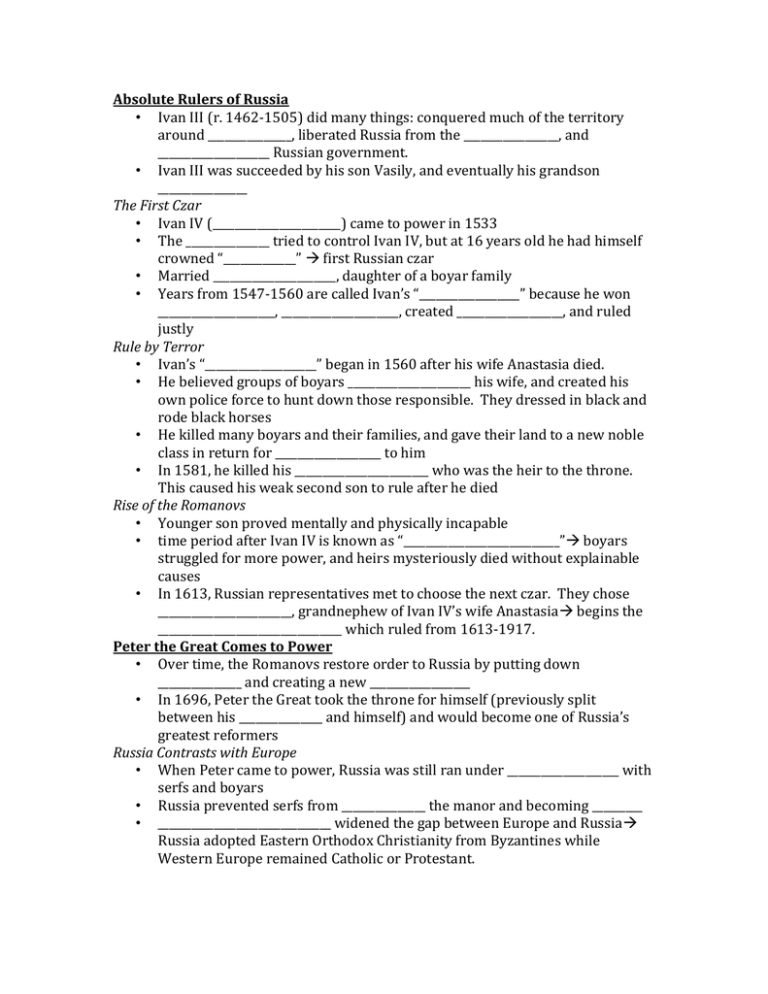
Absolute Rulers of Russia • Ivan III (r. 1462-1505) did many things: conquered much of the territory around _______________, liberated Russia from the _________________, and ____________________ Russian government. • Ivan III was succeeded by his son Vasily, and eventually his grandson ________________ The First Czar • Ivan IV (_______________________) came to power in 1533 • The _______________ tried to control Ivan IV, but at 16 years old he had himself crowned “_____________” first Russian czar • Married ______________________, daughter of a boyar family • Years from 1547-1560 are called Ivan’s “__________________” because he won _____________________, _____________________, created ___________________, and ruled justly Rule by Terror • Ivan’s “____________________” began in 1560 after his wife Anastasia died. • He believed groups of boyars ______________________ his wife, and created his own police force to hunt down those responsible. They dressed in black and rode black horses • He killed many boyars and their families, and gave their land to a new noble class in return for ___________________ to him • In 1581, he killed his ________________________ who was the heir to the throne. This caused his weak second son to rule after he died Rise of the Romanovs • Younger son proved mentally and physically incapable • time period after Ivan IV is known as “____________________________” boyars struggled for more power, and heirs mysteriously died without explainable causes • In 1613, Russian representatives met to choose the next czar. They chose ________________________, grandnephew of Ivan IV’s wife Anastasia begins the _________________________________ which ruled from 1613-1917. Peter the Great Comes to Power • Over time, the Romanovs restore order to Russia by putting down _______________ and creating a new __________________ • In 1696, Peter the Great took the throne for himself (previously split between his _______________ and himself) and would become one of Russia’s greatest reformers Russia Contrasts with Europe • When Peter came to power, Russia was still ran under ____________________ with serfs and boyars • Russia prevented serfs from _______________ the manor and becoming _________ • _______________________________ widened the gap between Europe and Russia Russia adopted Eastern Orthodox Christianity from Byzantines while Western Europe remained Catholic or Protestant. Culture was different in general due to the fact that Mongol rule in Russia had isolated them from the _____________________ and the _______________________, and the seaport in Archangel was frozen most of the year. Peter Visits the West • Peter believed in order to be stronger, Russia needed a _________________________ • In 1697, just a year after becoming czar, he began his “______________________” to gain ideas and innovations from Europeans first time a czar had traveled amongst “heretics” Peter Rules Absolutely • Peter returns from Europe and wants to adopt some of their culture in Russia “_________________________” Peter’s Reforms • In order to make sure Russia witnessed change, Peter began transforming his power into an _________________________ • He brought the Russian Orthodox church under state control by creating the “___________________” to steer the church in his direction • He reduced the power of __________________ • He recruited men from ________________________ families and then promised them ___________________ and ___________ for their ____________________ • He hired _____________________ to drill his soldiers on European ____________ and ________________. To pay for the army of 200,000 he raised __________. Westernizing Russia • To westernize Russia, Peter took these measures: 1. Introduced _________________, which became the staple of Russian diet 2. Started Russia’s first __________________ 3. Raised _________________ status 4. Ordered nobles to trash their clothes and adopt __________________________ 5. Advanced ______________________ in arts and sciences • He believed that education was the key to Russia’s progress Establishing St. Petersburg • Peter fought Sweden to gain a piece of the _____________________ to ensure Russia a warm-water port • In 1703, Russian troops occupied a new city on Swedish lands and eventually called it __________________________ • Building on a _________________ was hard work, and Peter required ______________ to leave home every summer and come to work in St. Petersburg to keep the city thriving • ______________________ died from ______________ and bad working ___________________ • In addition, he required many nobles to leave their homes in _______________ and move to __________________________ in order to settle the new capital • By his death in 1725, Peter had all but westernized Russia and helped Russia compete with Europe •
